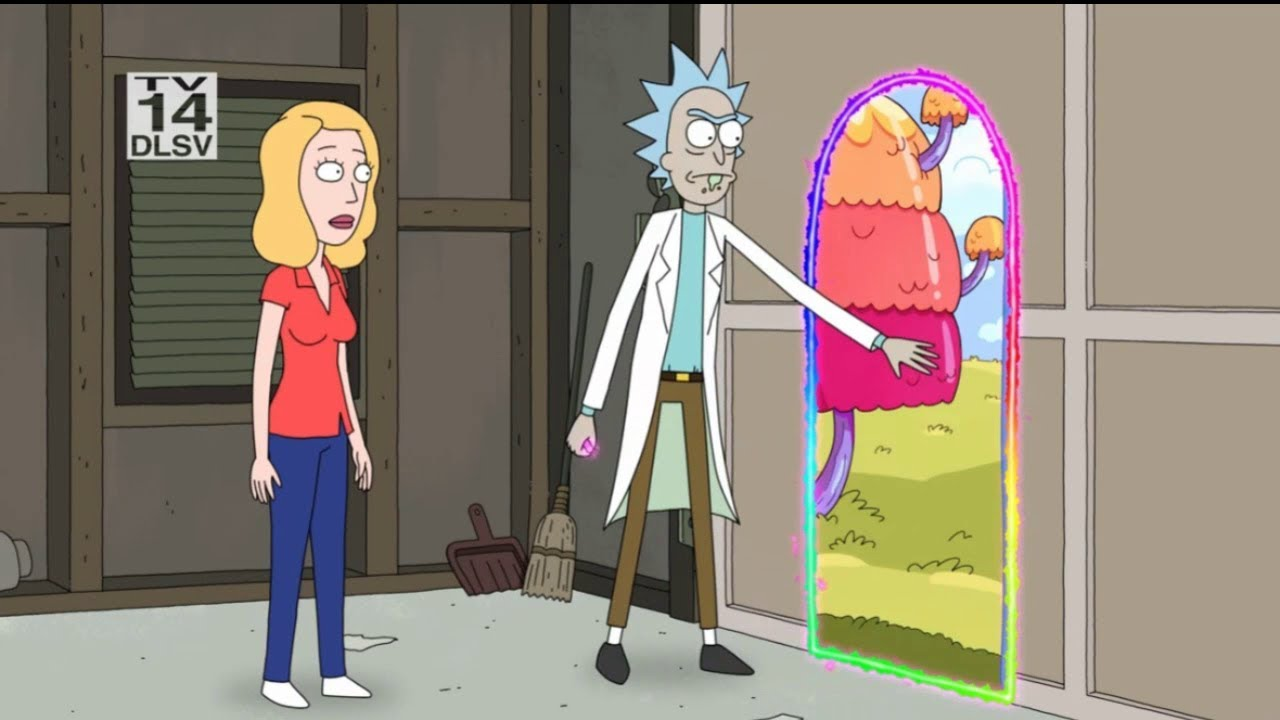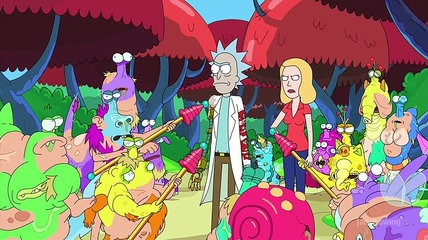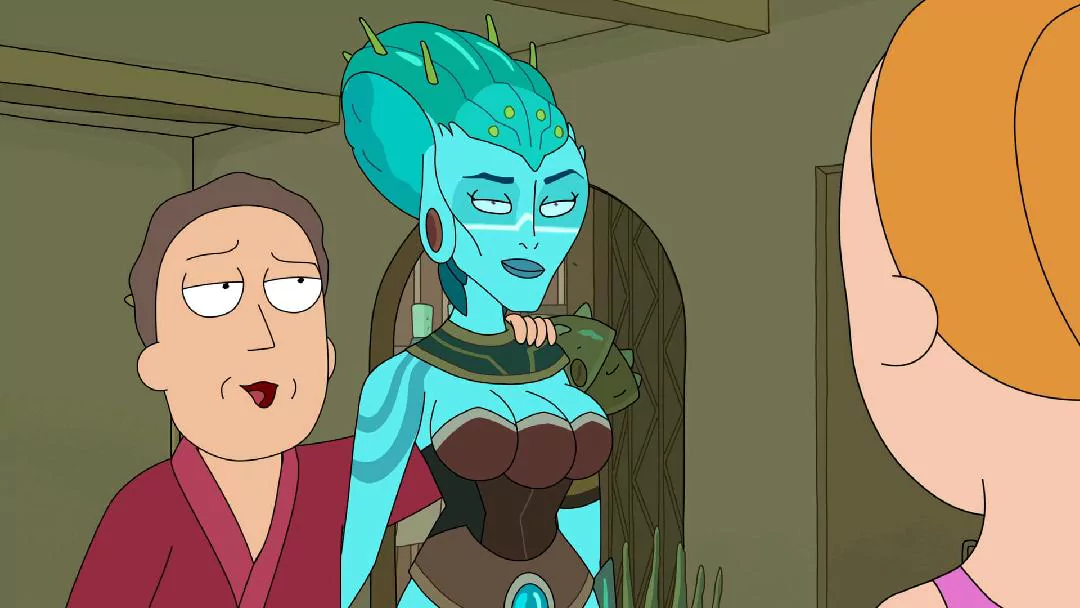Many apologies for missing last week’s episode of Rick and Morty. My absence was not a critique on the value of Morty’s Mindblowers, Salt Lake Comic Con was on the horizon and my efforts were concentrated on preparing for panels. Special thanks to everyone that came out to the Rick and Morty panel (what up, my glip glops?!), it was a hell of a time.
The show returned Sunday with The ABCs of Beth, a Beth centric episode (as the title suggests) that utilized the plot/sub-plot format most of the show has enjoyed. Returning to the usual format allowed for each member of the family to stretch their wings and it was nice to focus on some of the characters who have taken a back seat for most of the season.
The intro sequence tells us of an upcoming execution for a local man accused and convicted of eating his son many years ago. Beth relives the childhood trauma of losing her best friend Tommy to his cannibalistic father and the years of therapy it took to break her of the delusion that he had gone to live in Froopyland, the technicolor world of her imagination.
Upon hearing mention of Froopyland (and really at hearing the criticism of its naming) Rick sends Morty and Summer to their court ordered weekend with Jerry via transport bubbles, despite their protestations.

Wielding techno-magic chalk, Rick reveals that Froopyland is a real place, and opens a doorway there. Faced with the realization that her memories of time spent there were authentic, Beth berates her father for dumping her in a procedurally generated play land instead of spending time with her. Unable to admit his faults, Rick maintains that Froopyland was not created as a babysitter for Beth so that Rick wouldn’t have to spend time with her, but rather to protect the neighborhood from her psychopathic tendencies. A string of inventions are pulled from a box, seemingly created at an adolescent Beth’s request, and they range from harmless to terrifying.
Meanwhile, Morty and Summer arrive at their father’s fully expecting him to be a total Jerry, wallowing in his own sadness. Instead, what they find is a man who is put together, confident, and mildly telepathic. Which is when Jerry reveals he’s embarked on a new relationship with an alien warrior priestess.
Back in Froopyland, Rick and Beth search for the remains of Tommy who almost certainly starved to death in the intervening years, only to discover that the bouncy ground and breathable rainbow waters (making the landscape entirely safe for the unsupervised exploration of a child) have been invaded by vicious creatures. They quickly intuit that these creatures must be the hybrid spawn of Tommy who, in an attempt both to survive and placate his young libido, impregnated the synthetic creatures and ate them. The remaining creations (those less tasty) have created a society who now worship him.
Rick, complete with a robotic arm prosthesis gained after having his arm ripped off by vicious half-Tommy birds, and Beth are taken to see King Tommy. Rick quickly grows weary of their time in Froopyland, seeing no benefit to staying there and uses the chalk to abscond back home. Beth feels some responsibility for the impending death of Tommy’s father and returns to retrieve him in an attempt to stay the execution.
The rest of the episode goes off mostly without Rick’s help. Beth slaughters many of the inhabitants of Froopyland, rather than admit to Tommy that she pushed him into a pond of honey and trapped him there, showing that just like her father she is either unwilling or incapable of admitting her own faults.

Jerry finds himself overwhelmed by the intensity of his new relationship and lies, saying that Summer and Morty are offended by his paramore’s alien features in order to get out of the relationship. This results in her hunting them down so that she and Jerry can continue their romance. Jerry is finally forced to admit that not only is he racist, misogynistic, and cowardly, but that he is the one who wants to end their tryst, but only when Summer is on the brink of death.
This episode has cemented the realization that while Beth and Jerry seem to be most normal of the family, in fact they are the only ones incapable of facing their demons to the detriment of those around them. Rick, while tormented and entirely unhealthy, is at least capable of recognizing his ills, even if he won’t admit them to anyone else.
The episode wraps up with Beth and Rick creating a clone of Tommy (once again taking extreme measures in order to avoid admitting a mistake or even making a simple apology) in order to ensure his father isn’t executed for his murder. Despite the twisted turns that brought them here, it offers a warm family moment as the pair work together to solve a problem, giving Beth some of the father-daughter time she so craves.

In the midst of all this, Beth is forced to face the fact that she is very much like her father and ask herself what that means. In Rick’s closing monologue he tells her it means she can do whatever she wants, the universe is open to her and the only thing stopping her from being her best (or worst) self is her. Finally, he offers to create a clone of Beth, one with all of her memories and sentiments, that could pick up her life so that she is free to explore not just the universe but what it means to be Beth. She thinks for a moment, then says she knows what she needs to do.
We, as the audience, don’t see the end result of that decision. Instead, the scene cuts to Morty and Summer returning home. Beth and Rick join them at the table and the four of them enjoy pizza (pilfered from a neighboring universe in which daylight savings was never invented and their favorite pizza joint is still open).
This episode has continued the theme of season three in forcing Rick, at least in some small measure, to face up to the trauma he has caused his loved ones just by being around them. And in so doing, Beth became a more whole person, gaining something that even years of (misguided) therapy could give her. In a truly unusual moment, Rick even admits to caring about her, despite being unable to crystallize exactly what the cause of that love is. And does something selfless in offering her a way out, an action that gives him no direct benefit other than knowing one way or another that his daughter will be the happier for it.
At the episode’s close we’re left wondering if the Beth at the table is the true Beth or a doppelganger. We may never know and, in the end, as Rick is wont to say, it doesn’t really matter.
we’re left wondering of the Beth at the table is the true Beth or a doppelganger. We may never know and, in the end, as Rick is wont to say, it doesn’t really matter.